Jacob Gronholt-Pedersen,
Reuters•November 5, 2020
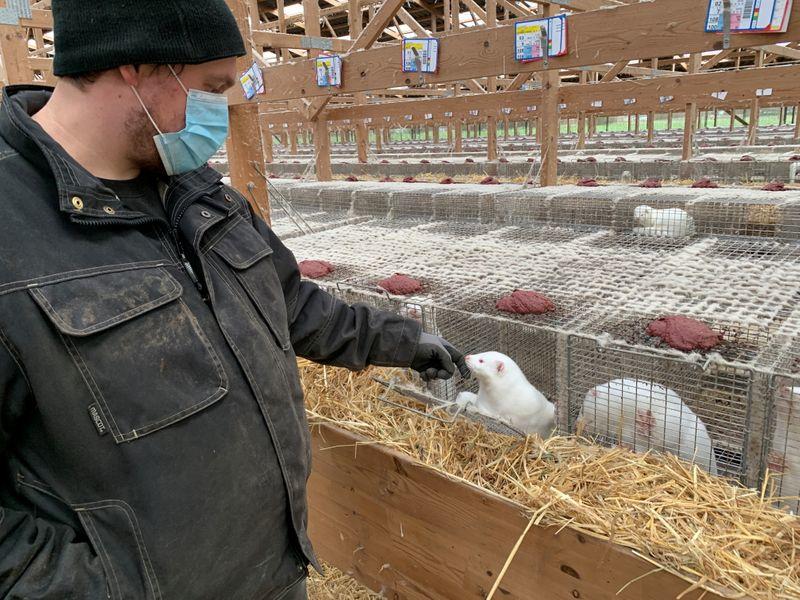
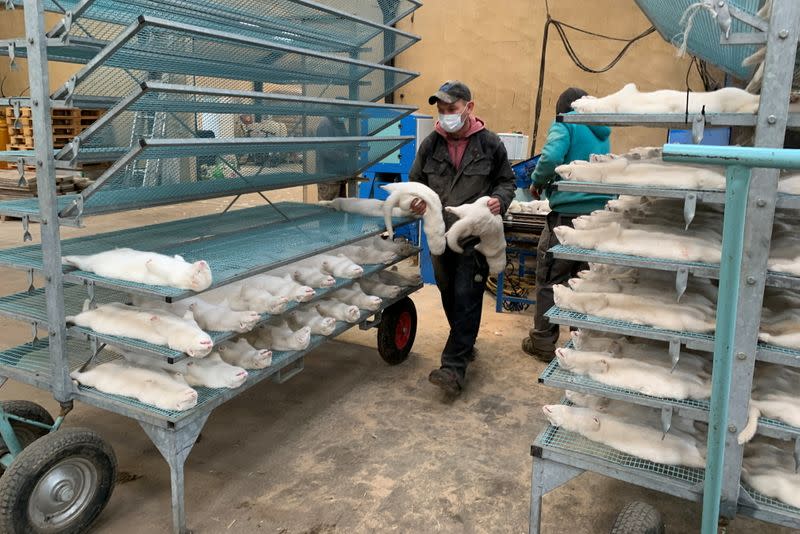
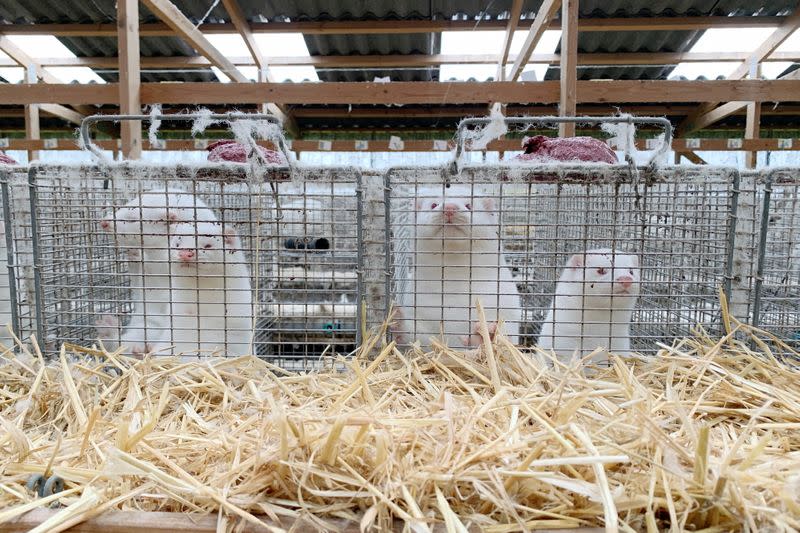
'It stops here': Danish mink farmer sees no future after mass cull
Hans Henrik Jeppesen interacts with one of his minks at his farm near Soroe
By Jacob Gronholt-Pedersen
SOROE, Denmark (Reuters) - Born and raised on a mink farm in eastern Denmark, Hans Henrik Jeppesen was about to take over the business from his father.
The plan is now in tatters, after the government announced this week that the country's entire mink population must be culled to prevent a mutated coronavirus from spreading in the animals and in humans.
The decision, described as a "black day" by the organisation representing a sector that exports $800 million worth of mink pelts annually, was particularly painful because Jeppesen's 36,000 minks are healthy and free from the virus.
"This is incredibly hard for me," the 34-year-old told Reuters at his farm in Soroe, some 60 km (37 miles) west of the capital Copenhagen. "This is my whole life."
He and his co-workers began culling the minks on Thursday, laying the dead, white-furred animals out in neat rows on metal trays. They have been given 10 days to complete the job.
Jeppesen said the industry, which employs 4,000 people in Denmark, would probably never recover from the blow. Some 17 million minks will be culled in total. Denmark is Europe's biggest producer and exporter of mink pelts.
"It stops here. We will never get the industry going again," he said.
Parts of northern Denmark, where most mink farms are located, faced new, tough lockdown measures to prevent human contagion with a mutated virus, which authorities said could be more resistant against future vaccines for people.
Jeppesen's farm is located far from the affected areas.
"We know that mink are extremely responsive to coronavirus, so I guess we just have to trust the authorities to make the right decision," he said.
He plans to sell the fur from the culled animals at auctions next year.
"Hopefully these last furs can cover our debt," said Jeppesen, who had just finished investing in equipment to keep the farm running for years to come.
He was close to completing a generational change from his father, who started the farm 40 years ago.
"This is in our blood. It's all we know," said the farmer, who got his first mink when he was a child.
Jeppesen, who has an agricultural education, has no plans for his future and does not know if he will stay on the farm.
"It will be mentally hard to stay here on the farm with all the animals gone."
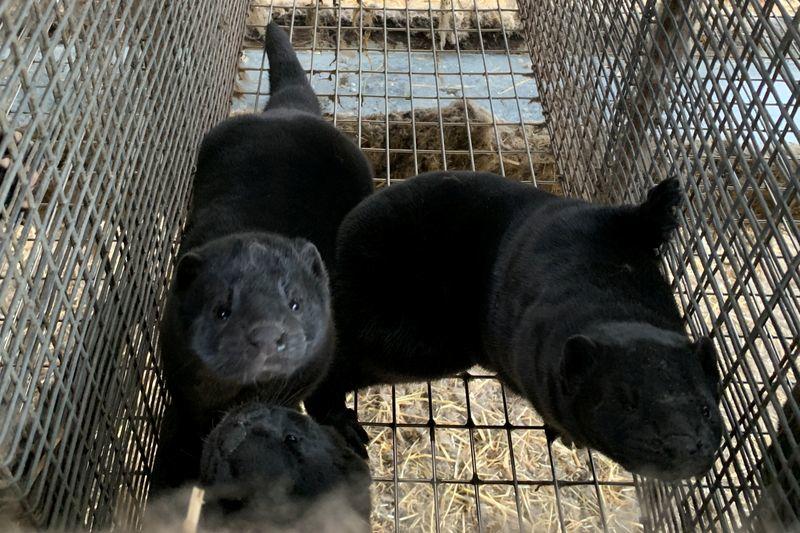
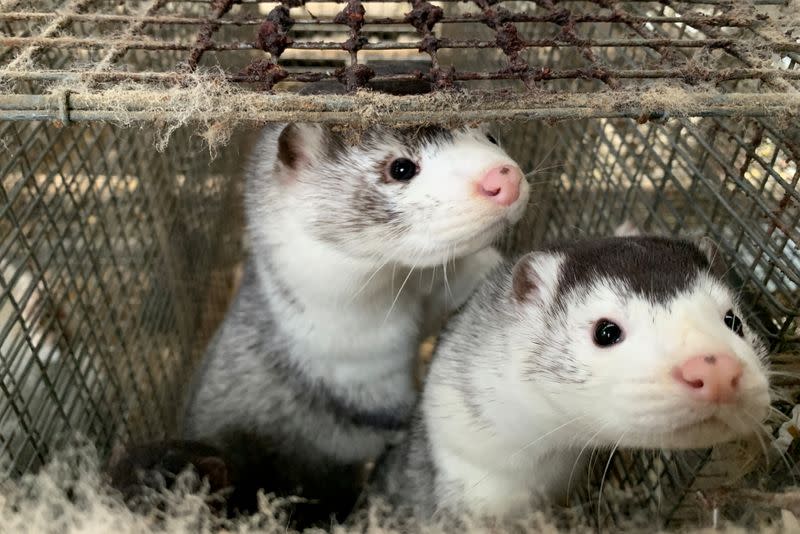
Minks are seen at Hans Henrik Jeppesen's farm near Soroe
(Reporting by Jacob Gronholt-Pedersen; Editing by Mike Collett-White)
Denmark to cull millions of minks over mutated coronavirus


Health authorities found coronavirus strains in humans and minks (above) that showed decreased sensitivity against antibodies.
PHOTO: REUTERS
PUBLISHEDNOV 5, 2020, 12:19 AM SGT
COPENHAGEN (AFP) - Denmark, the world’s biggest producer of mink fur, said on Wednesday (Nov 4) it would cull all of the country’s minks after a mutated version of the new coronavirus was detected at mink farms and had spread to people.
The mutation “could pose a risk that future (coronavirus) vaccines won’t work the way they should,” Prime Minister Mette Frederiksen told a press conference.
“It is necessary to cull all the minks.” Denmark’s police chief Thorkild Fogde said they would start the culling as “soon as possible,” but conceded that with 15 million to 17 million minks spread over 1,080 farms it was “a very large undertaking”.
The World Health Organisation said the novel coronavirus spreads primarily through human-to-human transmission, but that “there is evidence of transmission at the human-animal interface”.
Several animals – including dogs and cats – have tested positive for the virus and there have been reported cases at mink farms in the Netherlands and Spain, as well as in Denmark.
“In a few instances, the minks that were infected by humans have transmitted the virus to other people. These are the first reported cases of animal-to-human transmission,” the WHO said in a statement sent to AFP.
The novel coronavirus has been detected at 207 Danish mink farms, including some cases with a mutated version that has been confirmed to spread back to humans.
Health authorities have also concluded that the mutated virus “is not inhibited by antibodies to the same degree as the normal virus”.
“Studies have shown that the mutations may affect the current candidates for a Covid-19 vaccine,” Health Minister Magnus Heunicke said.
“It is a threat to the development of coronavirus vaccines. That is why it is important that we make a national effort,” he added.
While the majority of cases had been observed in the northern part of the Jutland region, all minks in the country would still be culled.
The World Organisation for Animal Health (OIE) is developing new technical guidance on animal health, including on testing and quarantine, the WHO said.
PUBLISHEDNOV 5, 2020, 12:19 AM SGT
COPENHAGEN (AFP) - Denmark, the world’s biggest producer of mink fur, said on Wednesday (Nov 4) it would cull all of the country’s minks after a mutated version of the new coronavirus was detected at mink farms and had spread to people.
The mutation “could pose a risk that future (coronavirus) vaccines won’t work the way they should,” Prime Minister Mette Frederiksen told a press conference.
“It is necessary to cull all the minks.” Denmark’s police chief Thorkild Fogde said they would start the culling as “soon as possible,” but conceded that with 15 million to 17 million minks spread over 1,080 farms it was “a very large undertaking”.
The World Health Organisation said the novel coronavirus spreads primarily through human-to-human transmission, but that “there is evidence of transmission at the human-animal interface”.
Several animals – including dogs and cats – have tested positive for the virus and there have been reported cases at mink farms in the Netherlands and Spain, as well as in Denmark.
“In a few instances, the minks that were infected by humans have transmitted the virus to other people. These are the first reported cases of animal-to-human transmission,” the WHO said in a statement sent to AFP.
The novel coronavirus has been detected at 207 Danish mink farms, including some cases with a mutated version that has been confirmed to spread back to humans.
Health authorities have also concluded that the mutated virus “is not inhibited by antibodies to the same degree as the normal virus”.
“Studies have shown that the mutations may affect the current candidates for a Covid-19 vaccine,” Health Minister Magnus Heunicke said.
“It is a threat to the development of coronavirus vaccines. That is why it is important that we make a national effort,” he added.
While the majority of cases had been observed in the northern part of the Jutland region, all minks in the country would still be culled.
The World Organisation for Animal Health (OIE) is developing new technical guidance on animal health, including on testing and quarantine, the WHO said.
No comments:
Post a Comment